
The politics of Kenya take place in a framework of a presidential representative democratic republic, whereby the President of Kenya is both head of state and head of government, and of a multi-party system in accordance with a new constitution passed in 2010.
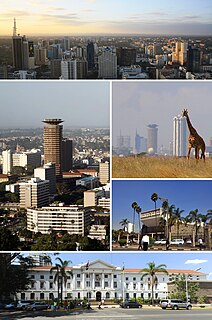
Nairobi is the capital and the largest city of Kenya. The name comes from the Maasai phrase Enkare Nairobi, which translates to "cool water", a reference to the Nairobi River which flows through the city. The city proper had a population of 4,397,073 in the 2019 census, while the metropolitan area has a population of 9,354,580. The city is popularly referred to as the Green City in the Sun.

Daniel Toroitich arap Moi was a Kenyan statesman and politician who was the second and longest-serving President of Kenya from 1978 to 2002. He previously served as the third Vice President of Kenya from 1967 to 1978, and succeeded President Jomo Kenyatta following the latter's death.

The Kenya African National Union (KANU) is a Kenyan political party that ruled for nearly 40 years after Kenya's independence from British colonial rule in 1963 until its electoral loss in 2002. It was known as Kenya African Union (KAU) from 1944 to 1952. The KAU was banned by the colonial government from 1952 to 1960. It was re-established by James Gichuru in 1960 and renamed KANU on 14 May 1960 after a merger with Tom Mboya's Kenya Independence Movement.

The president of the Republic of Kenya is the head of state and head of government of Kenya. The president leads the executive arm of the Government of Kenya and is the commander-in-chief of the Kenya Defence Forces. The official residence of the president is State House, Nairobi.
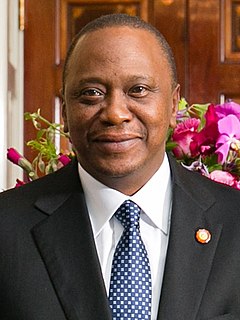
Uhuru Muigai Kenyatta is a Kenyan politician who has served as the fourth and President of Kenya since 2013. He served as the member of parliament (MP) for Gatundu South from 2002 to 2013. He also served as Deputy Prime Minister from 2007 to 2013. Currently, he is a member and the party leader of the Jubilee Party of Kenya. Uhuru was previously associated with the Kenya Africa National Union (KANU) before founding The National Alliance (TNA), one of the allied parties that campaigned for his election during the 2013 general elections and later on went to form a merger with the William Samoei Ruto's United Republican Party (URP) to form the Jubilee Party. Uhuru's tenure has been marred by endless cases of corruption and impunity.
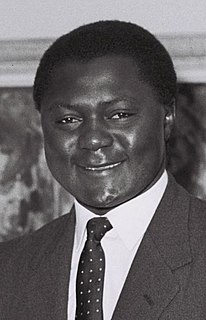
Thomas Joseph Odhiambo Mboya was a Kenyan trade unionist, educator, Pan-Africanist, author, independence activist, and statesman. He was one of the founding fathers of the Republic of Kenya. He led the negotiations for independence at the Lancaster House Conferences and was instrumental in the formation of Kenya's independence party – the Kenya African National Union (KANU) – where he served as its first Secretary-General. He laid the foundation for Kenya's capitalist and mixed economy policies at the height of the Cold War and set up several of the country's key labour institutions.
Sagana State Lodge is a Kenyan state lodge, located in Kiganjo town in Nyeri County, on the foothills of Mount Kenya. The lodge is used by the President when on official tours of the country.

Raila Amolo Odinga is a Kenyan politician who served as the Prime Minister of Kenya from 2008 to 2013. He is assumed as the Leader of Opposition in Kenya since 2013 as the New Constitution of Kenya does not prescribe for such a position. He was the Member of Parliament (MP) for Langata from 1992 to 2007. Raila Odinga served in the Cabinet of Kenya as Minister for Energy from 2001 to 2002, and as the Minister for Roads, Public Works and Housing from 2003 to 2005. Odinga was appointed High Representative for Infrastructure Development at the African Union Commission in 2018.

Corruption in the post-colonial government of Kenya has a history which spans the era of the founding president Jomo Kenyatta, to Daniel arap Moi's KANU, Mwai Kibaki's PNU government and the current Uhuru Kenyatta's Jubilee Party government. In the Corruption Perceptions Index 2020 Kenya is ranked 124th out of 180 countries for corruption, tied with Bolivia, Kyrgyzstan, Mexico, and Pakistan.

China–Kenya relations refer to the bilateral relations between China and Kenya.

Kenya–United States relations are bilateral relations between Kenya and the United States. Kenya and the United States have long been close allies and have enjoyed cordial relations since Kenya's independence. Relations became even closer after Kenya's democratic transition of 2002 and subsequent improvements in human rights.

The Government of the Republic of Kenya (GoK) is the national government of the republic of Kenya which is composed of 47 Counties, each county with its own semi-autonomous governments. The national government is composed of three arms: The Legislature, the Executive and the Judiciary. Each arm is independent of the other and their individual roles are set by the Constitution of Kenya. The full name of the country is the "Republic of Kenya". Its official Swahili name is 'Jamhuri ya Kenya'. Other terms such as GoK, GK and Serikali are popularly used to refer to the Kenyan government.
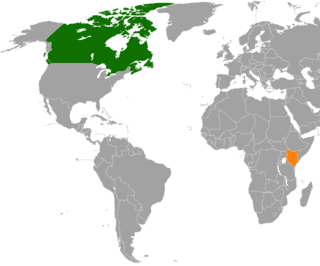
Canada–Kenya relations are the bilateral relations between Canada and the Republic of Kenya. Both nations are members of the Commonwealth of Nations and the United Nations.

General elections were held in Kenya on 4 March 2013. Voters elected the President, members of the National Assembly and newly formed Senate. They were the first elections held under the new constitution, which was approved in a 2010 referendum, and were also the first run by the new Independent Electoral and Boundaries Commission (IEBC). They coincided with the 2013 Kenyan local elections.

The Kenyatta family is the family of Jomo Kenyatta, the first President of Kenya and a prominent leader in that country's independence. Born into the dominant Kikuyu culture, Kenyatta became its most famous interpreter of Kikuyu traditions through his book Facing Mount Kenya.
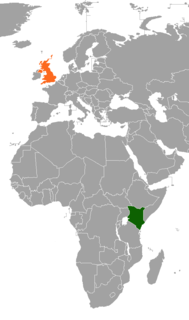
Kenya–United Kingdom relations are bilateral relations between Kenya and the United Kingdom. The United Kingdom has been a partner of Kenya in many areas, particularly trade and security (military). Both nations are members of the Commonwealth of Nations and the United Nations.

Kenya–Qatar relations are bilateral relations between Kenya and Qatar. Diplomatic relations between the two countries were first established in 2003.
Magana Njoroge Mungai, M.D. EGH was a Kenyan Cabinet Minister, Member of Parliament, doctor, businessman, farmer, politician, nationalist and one of the founding fathers of the Republic of Kenya.



















